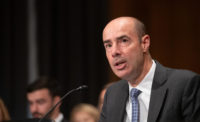Infrastructure Funding
Chao Says Highway-Transit Bill Could Be Infrastructure Vehicle

Chao suggests FAST Act successor might be the base for infrastructure legislation.
PHOTO BY KEVIN DIETSCH/UPI/NEWSCOM
With talk percolating in Washington, though seemingly not on everyone’s front burner, about infrastructure legislation, Transportation Secretary Elaine Chao is suggesting using the expected surface-transportation reauthorization bill as the main legislative vehicle, instead of rolling out that highway-transit measure along with a broader infrastructure proposal.
Testifying at a March 27 Senate appropriations subcommittee hearing on the Dept. of Transportation’s fiscal year 2020 budget request, Chao said, “Does it make sense to have two vehicles, an infrastructure bill and a surface reauthorization?”
She added, “Given the compressed time frame, it may very well be that…it’s easier for everyone—ourselves as well as the Senate and the House—to have one vehicle and that perhaps should be the surface reauthorization bill.”
Subcommittee Chair Susan Collins (R-Maine) noted that the Trump administration’s DOT budget proposal didn’t provide a solution to the revenue shortfall in the Highway Trust Fund, the main financial support for the highway program, and to a lesser degree, for transit, too. Collins said, “It is imperative that the administration work with the authorizing committees to enact a long-term surface transportation bill that provides realistic funding for the Highway Trust Fund.”
The subcommittee’s top Democrat, Jack Reed of Rhode Island, wants to see a sizable increase in the new highway-transit bill’s total dollars. He said, “Small [funding] adjustments for inflation are a nonstarter.”
That new bill, which has yet to be drafted, would succeed the 2015 Fixing America’s Surface Transportation, or FAST, Act. One thing prodding Congress to act on a follow-on bill is that there is a deadline—the FAST Act lapses on Sept. 30, 2020.
Chao said that there are infrastructure discussions ongoing at the White House. Nearly all observers agree that the critical issue in fixing the trust fund is finding new revenue. Asked whether the administration supports a gas-tax increase—a trust-fund fix that several construction and business groups support— she reiterated earlier comments, saying, “I think the good news is that everything is on the table.”
Chao said, “We have certainly learned from the past that such a [legislative] project should not be done in isolation but that it should be done in consultation with the Congress.” Sen. Richard Durbin (D-Ill.) said, “That, I think, is a great idea.”
Appropriators also focused on the administration’s proposed 2020 spending levels for DOT. In fiscal 2018 and in 2019, highways, transit and airports all benefited from an infrastructure “bonus” contained in a February 2018 bipartisan budget deal. That agreement led to additional infrastructure funding totaling more than $10 billion in each of the past two years.
Reed said those 2019 numbers “should be the baseline from which new transportation investment should grow.”
But, Collins observed that the administration’s 2020 DOT budget cut the department’s discretionary funding by $5 billion from 2019. Reed was on the same page, saying the 2020 request “backslides from the investments we made in 2019.”
Chao said the 2020 request didn’t include continuing the bonus funds from the budget pact, saying those levels were “one-time" increases.
Collins and Reed are calling for Congress to strike a new budget agreement like the one in 2018, with additional money for the overall discretionary category, including infrastructure programs.
If there is no such deal this year, Collins said that “the total funding available for nondefense discretionary programs, such as the vital transportation programs…will fall by $55 billion.”
Whether a deal will materialize this year, however, remains to be seen.




